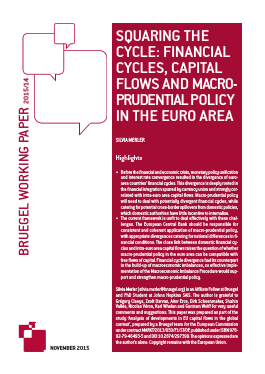Working Paper
Squaring the cycle: capital flows, financial cycles, and macro-prudential policy in the euro area
The financial crisis has prompted a renewed interest in macro-prudential policy as a framework to address the stability of the financial system as a whole, rather than only its individual components. The purpose of this paper is to contribute to the European macro-prudential discussion by establishing empirically the special challenges that the set-up of macro-prudential policy in the euro area needs to confront.
Highlights
- Before the financial and economic crisis, monetary policy unification and interest rate convergence resulted in the divergence of euro-area countries’ financial cycles. This divergence is deeply rooted in the financial integration spurred by currency union and strongly correlated with intra-euro area capital flows. Macro-prudential policy will need to deal with potentially divergent financial cycles, while catering for potential cross-border spillovers from domestic policies, which domestic authorities have little incentive to internalise.
- The current framework is unfit to deal effectively with these challenges. The European Central Bank should be responsible for consistent and coherent application of macro-prudential policy, with appropriate divergences catering for national differences in financial conditions. The close link between domestic financial cycles and intra-euro area capital flows raises the question of whether macro-prudential policy in the euro area can be compatible with free flows of capital. Financial cycle divergence had its counterpart in the build-up of macroeconomic imbalances, so effective implementation of the Macroeconomic Imbalance Procedure would support and strengthen macro-prudential policy.











